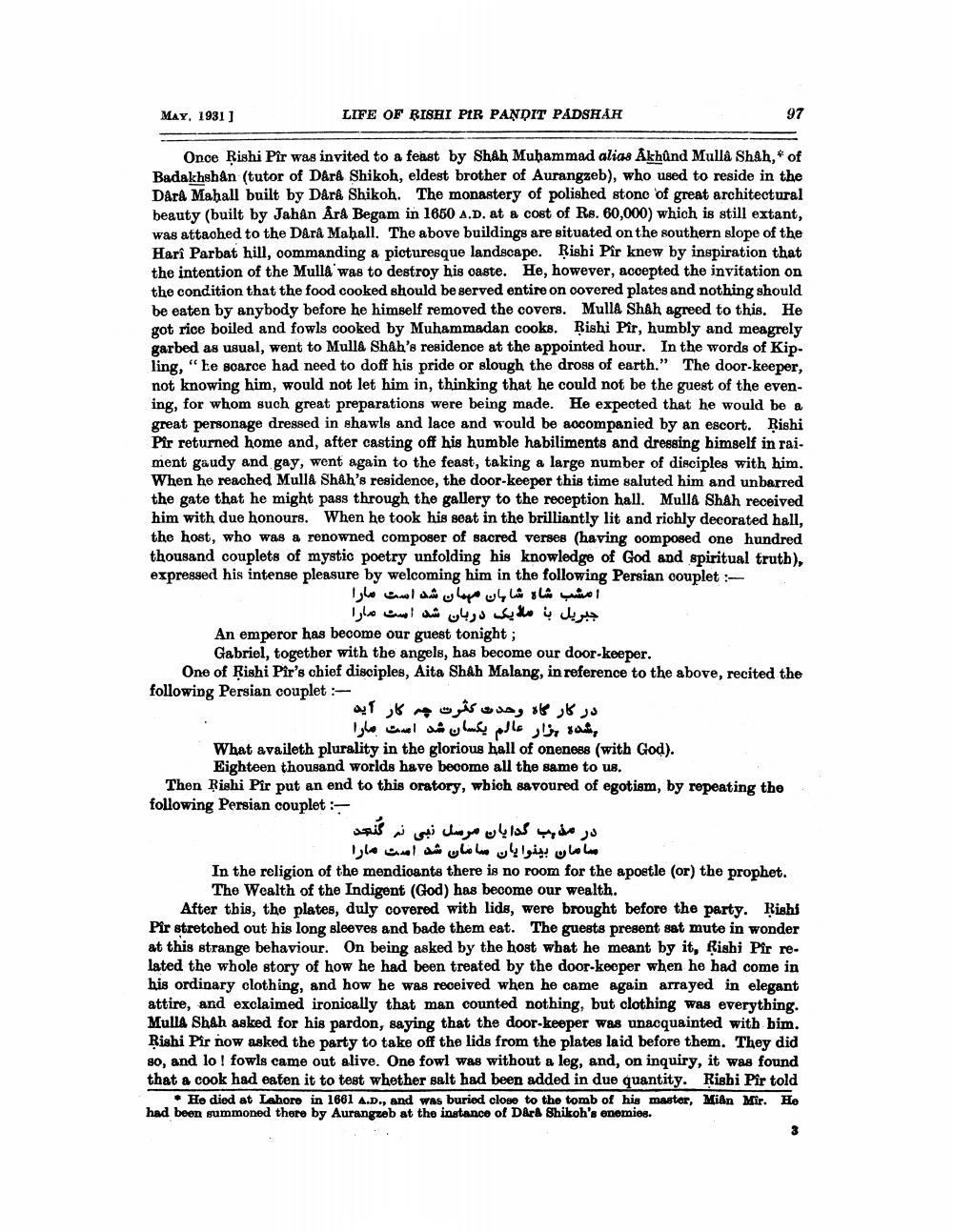________________
May, 1931 ]
LIFE OF RISHI PIR PANDIT PADSHAH
Once ķishi Pîr was invited to a feast by Shah Muhammad alias Akhữnd Mullâ Shah,* of Badakhshan (tutor of Dårå Shikoh, eldest brother of Aurangzeb), who used to reside in the Dara Mahall built by Dark Shikoh. The monastery of polished stone of great architectural beauty (built by Jahan Ara Begam in 1650 A.D. at a cost of Rs. 60,000) which is still extant, was attached to the Dårå Mahall. The above buildings are situated on the southern slope of the Harî Parbat hill, oommanding a picturesque landscape. Rishi Pir knew by inspiration that the intention of the Mulla was to destroy his oaste. He, however, accepted the invitation on the condition that the food cooked should be served entire on covered plates and nothing should be eaten by anybody before he himself removed the covers. Mulla Shah agreed to this. He got rice boiled and fowls cooked by Muhammadan cooks. Rishi Pir, humbly and meagrely garbed as usual, went to Mulla Shah's residence at the appointed hour. In the words of Kipling, "Le soarce had need to doff his pride or slough the dross of earth.” The door-keeper, not knowing him, would not let him in, thinking that he could not be the guest of the evening, for whom such great preparations were being made. He expected that he would be a great personage dressed in shawls and lace and would be accompanied by an escort. Rishi Pir returned home and, after casting off his humble habiliments and dressing himself in rai. ment gaudy and gay, went again to the feast, taking a large number of disciples with him. When he reached Mulla Shah's residence, the door-keeper this time saluted him and unbarred the gate that he might pass through the gallery to the reception hall. Mulla Shah received him with due honours. When he took his seat in the brilliantly lit and richly decorated hall, the host, who was a renowned composer of sacred verses (having oomposed one hundred thousand couplets of mystic poetry unfolding his knowledge of God and spiritual truth), expressed his intense pleasure by welcoming him in the following Persian couplet :
امشب شاه شاهان مهمان شده است مارا جبريل با ملایک دربان شده است مارا
An emperor has become our guest tonight;
Gabriel, together with the angels, has become our door-keeper. One of Rishi Pir's chief disciples, Aita Shah Malang, in reference to the above, recited the following Persian couplet :
در کار اه وحدت کثرت چه کار آید شده زار عالم یکسان شد اعدت مارا
What availeth plurality in the glorious hall of oneness (with God).
Eighteen thousand worlds have become all the same to us. Then Rishi Pir put an end to this oratory, which savoured of egotism, by repeating the following Persian couplet :
در مدب گدا یان مرسل نبی نم گنعد مامان بینوا بان مامان شد امث مارا
In the religion of the mendioants there is no room for the apostle (or) the prophet.
The Wealth of the Indigent (God) has become our wealth. After this, the plates, duly covered with lids, were brought before the party. Rishi Pir stretched out his long sleeves and bade them eat. The guests present sat mute in wonder at this strange behaviour. On being asked by the host what he meant by it, Rishi Pîr related the whole story of how he had been treated by the door-keeper when he had come in his ordinary clothing, and how he was received when he came again arrayed in elegant attire, and exclaimed ironioally that man counted nothing, but clothing was everything. Mulla Shah asked for his pardon, saying that the door-keeper was unacquainted with him. Rishi Pir now asked the party to take off the lids from the plates laid before them. They did so, and lo! fowls came out alive. One fowl was without a leg, and, on inquiry, it was found that a cook had eaten it to test whether salt had been added in due quantity. Rishi Pir told
• He died at Lahore in 1661 A.D., and was buried close to the tomb of his master, Miên Mir. He had been summoned there by Aurangzeb at the instance of Dard Shikoh's enemies.




